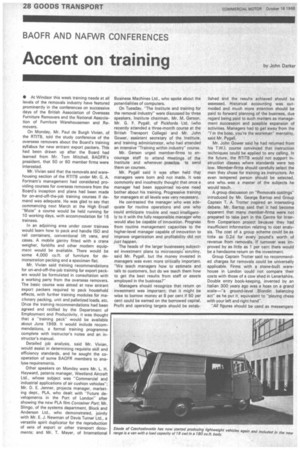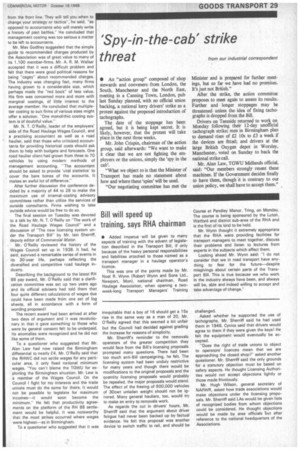BAOFR AND NAFWR CONFERENCES
Page 30

Page 31

If you've noticed an error in this article please click here to report it so we can fix it.
Accent on training by John Darker
• At Windsor this week training needs at all levels of the removals industry have featured prominently in the conferences on successive days of the British Association of Overseas Furniture Removers and the National Association of Furniture Warehousemen and Removers.
On Monday, Mr. Paul de Burgh Vivian, of the RTITB, told the study conference of the overseas removers about the Board's training syllabus for new entrant export packers. This had been drawn up after the Board had learned from Mr. Tom Mitchell. BAOFR's president, that 50 or 60 member firms were interested.
Mr. Vivian said that the removals and warehousing section of the RTITB under Mr. G. A. Fortnam's management had considered providing courses for overseas removers from the Board's inception and plans had been made for on-and-off-the-job training courses if demand was adequate. He was glad to say that commencing next March at the High Ercall "Motea course would be held running for 10 working days, with accommodation for 16 trainees.
In an adjoining area under cover trainees would learn how to pack and handle ISO and rail containers, conventional lift vans, and cases. A mobile gantry fitted with a crane weigher, forklifts and other modern equipment would be available. There would be some 4,000 cu.ft, of furniture for demonstration packing and a specimen flat.
Mr. Vivian said training recommendations for on-and-off-the-job training for export packers would be formulated in consultation with a working party from the overseas removers. The basic course was aimed at new entrant export packers required to pack household effects, with further training modules for machinery packing, unit and palletized loads, etc. Once the training recommendations had been agreed and ratified by the Department of Employment and Productivity, it was thought that a "training pack" would be available about June 1969. It would include recommendations, a formal training programme complete with instructor's notes and an instructor's manual.
Detailed job analysis, said Mr. Vivian, would assist in determining requisite skill and efficiency standards, and he sought the cooperation of some BAOFR members to analyse requirements.
Other speakers on Monday were Mr. L. H. Hayward, patents manager, Westland Aircraft Ltd., whose subject was "Commercial and industrial applications of air cushion vehicles"; Mr. D. E. Jenner, projects manager, marketing dept., PLA, who dealt with "Future developments in the Port of London" after showing the new PLA film Container Port: Mr. Slingo, of the systems department, Block and Anderson Ltd., who demonstrated, jointly with Mr. E. J. Newman of Davis Turner. Ltd., a versatile spirit duplicator for the reproduction of sets of export or other transport documents; and Mr. T. Mayer, of International
Business Machines Ltd., who spoke about the potentialities of computers.
On Tuesday, "The Institute and training for the removal industry" were discussed by three speakers, Institute chairman, Mr. M. Gerson, Mr. G. F. Pygall, of Pickfords Ltd. (who recently attended a three-month course at the British Transport College) and Mr. John Gower, assistant secretary of the Institute, and training administrator, who had attended an intensive "Training within industry" course.
Mr. Gerson urged member-firms to encourage staff to attend meetings of the Institute and whenever possible to send them on courses.
Mr. Pygall said it was often held tha;t managers were born and not made. It was commonly and incorrectly thought that once a manager had been appointed no-one need bother about his training. Progressive training for managers at all levels was very necessary.
He contrasted the manager who was adequate for routine operations and one who could anticipate trouble and react intelligently to it with the fully responsible manager who would also be capable of innovation. Progress from routine management capacities to the higher-level manager capable of innovation to improve organization and profitability did not just happen.
The heads of the larger businesses subjected investment plans to microscopic scrutiny, said Mr. Pygall, but the money invested in managers was even more critically important. "We teach managers how to estimate and talk to customers, but do we teach them how to get the best results from staff or assets employed in the business?"
Managers should recognize that return on investment was important: that it might be wise to borrow money at 8 per cent if 50 per cent could be earned on the borrowed capital. Profit and operating targets should be estab
lished and the results achieved should be assessed. Historical accounting was outmoded and much more attention should be paid to forward planning of the business, due regard being paid to such matters as management succession and possible expansion of activities. Managers had to get away from the "I'm the boss, you're the workman" mentality, said Mr. Pygall.
Mr. John Gower said he had returned from his T.W.I. course convinced that instruction techniques could be applied to any calling. In the future, the RTITB would not support instruction classes where standards were too low. Member-firms should carefully select the men they chose for training as instructors. An even tempered person should be selected, one who was a master of the subjects he would teach.
A group discussion on "Removals castings" introduced by Mr. George Bartop and Group Captain T. A. Trotter inspired an interesting debate. Mr. Bartop said that it had become apparent that many member-firms were not prepared to take Part in the Centre for Interfirm Comparison project because they had insufficient information relating to cost analysis. The cost of a group scheme could be as little as 0.2d for every pound's worth of revenue from removals. If turnover was improved by as little as 1 per cent there would be a handsome return on the investment.
Group Captain Trotter said no recommended charges for removals could be universally applicable. Firms with a stone-built warehouse in London could not compare their costs with those of a cow shed in Lanarkshire. Double entry book-keeping, invented by an Italian 300 years ago was a hoax on a grand scale—"a ground-level Blondin balancing act" as he put it, equivalent to "playing chess with your left and right hand".
"All figures should be used as messengers from the front line. They will tell you when to change your strategy or tactics", he said, "as opposed to accountants who will merely write a history of past battles." He concluded that management costing was too serious a matter to be left to accountants.
Mr. Max Godfrey suggested that the simple guide to recommended charges produced by the Association was of great value to many of its 1,100 member-firms. Mr. A. R. M. Walker accepted that it was a difficult problem and felt that there were good political reasons for being "cageyabout recommended charges. The industry was changing fast, many firms having grown to a considerable size, which perhaps made the -red book" of less value. His firm was concerned more and more with marginal costings, of little interest to the average member. He concluded that multipletier costing to suit firms of various sizes might offer a solution, "One monolithic costing systern is of doubtful value."
Mr. N. T. O'Reilly, leader of the employers' side of the Road Haulage Wages Council, and a practising accountant as well as a road haulier, said that those who criticized accountants for providing historical costs should ask them to help with budgets and forecasts. One road haulier client had grown from three to 70 vehicles by using modern methods of management accounting. "The accountant should be asked to provide 'vital statistics' to cover the bare bones of the accounts. It makes an awful lot of difference."
After further discussion the conference decided by a majority of 44 to 29 to make the maximum use of internal-costing advisory committees rather than utilize the services of outside consultants. Firms wishing to take outside advice would be free to do so.
The final session on Tuesday was devoted to a talk by Mr. N. T. O'Reilly on "The work of the Road Haulage Wages Counciland a discussion of -The new licensing system under the Transport Bill" by Mr. lain Sherriff, deputy editor of Commercial Motor.
Mr. O'Reilly reviewed the history of the Wages Council set up in 1938. It had, he said, survived a remarkable series of events in its 30-year life, perhaps reflecting the diversified and competitive road haulage industry.
Describing the background to the latest RH 88 pay award, Mr. O'Reilly said that a clarification committee was set up two years ago and its official advisers had told them that four quite different calculations of wages due could have been made frOm one set of log sheets, all in accordance with a form of wording proposed!
The recent award had been arrived at after two days of argument and it was revolutionary in that it gave something to those who were by general consent felt to be underpaid, Its anomalies were recognized and he did not like some of them.
To a questioner who suggested that Mr. Alan Law had now raised the Birmingham differential to nearly £4, Mr. O'Reilly said that the RHWC did not settle wages for any particular area, it only fixed national minimum wages. -You can't blame the TGWU for exploiting the Birmingham situation. Mr. Law is a member of the Wages Council. On the Council I fight for my interests and the trade unions must do the same for theirs. It would not be possible to legislate for maximum incomes—it would soon become the minimum." He felt that productivity agreements on the platform of the RH 88 settlement would be helpful. It was noteworthy that the most strikes occurred where wages were highest--as in Birmingham.
To a questioner who suggested that it was inequitable that a boy of 16 should get a 15s rise in the same way as a man of 20, Mr. O'Reilly agreed that this seemed a bit unfair but the Council had decided against grading the increase for reasons of simplicity.
Mr. Sherriff's reminder to the removals operators of the greater competition they would face from the Bill's licensing proposals prompted many questions. There had been too much anti-Bill campaigning, he felt. The licensing system had been unduly restrictive for many years and though there would be modifications to the original proposals and the quantity licensing proposals would probably be repealed, the major proposals would stand. The effect of the freeing of 900,000 vehicles of 30cwt unladen weight should not be ignored. Many general hauliers, too, would try to make an entry to removals work.
As regards the cut in drivers' hours, Mr. Sherriff said that the argument about driver fatigue had never been backed up by factual evidence. He felt this proposal was another device to switch traffic to rail, and should be challenged.
Asked whether he supported the use of tachographs, Mr. Sherriff said he had used them in 1946. Cynics said that drivers would agree to them if they were given the keys! He felt the equipment would eventually be accepted.
"Does the right of trade unions to object to operators' licences mean that we are approaching the closed shop?" asked another questioner. Mr. Sherriff said the only grounds for a statutory objection must be based on safety aspects. He thought Licensing Authorities would not accept objections lightly or those made frivolously.
Mr. Hugh Wilson, general secretary of NAFVVR, asked how trade associations would make objections under the licensing proposals. Mr. Sherriff said LAs would be given lists of recognized bodies from whom objections could be considered. He thought objections would be made by area officials but after reference to the national headquarters of the Associations.
























































































































